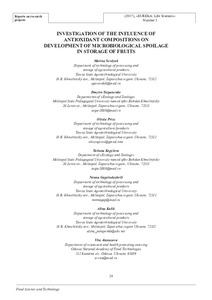Please use this identifier to cite or link to this item:
http://elar.tsatu.edu.ua/handle/123456789/2320| Title: | Investigation of the influence of antioxidant compositions on development of microbiological spoilage in storage of fruits |
| Authors: | Serdyuk, M. Stepanenko, D. Priss, O. Kopylova, T. Gaprindashvili, N. Kulik, A. Atanasova, V. Kashkano, M. Kozonova, J. |
| Keywords: | apple fruits;pear fruits;plump fruits;dimethyl sulfoxide;ionol;polyethylene glycols;after-harvest processing;fungal molds |
| Issue Date: | 2017 |
| Series/Report no.: | Eureka: life sciences;№ 3 |
| Abstract: | The studies are devoted to the scientific grounding of expedience of after-harvest processing by antioxidant compositions for preventing the development of pathogenic microflora on fruit surfaces during a long storage. For the studies were used apple fruits of the varieties Aidared, Golden Dushesse, Renet Simirenka, pear fruits of the varieties Victoria, Crimea Raisin and Cure, plum fruits of the varieties Voloshka, Stanley and Italian Ugorka. Fruits were processed by immersion in the following antioxidant compositions: ACM is a mixture of dimethyl sulfoxide, ionol and polyethylene glycols; AARL – mixture of ascorbic acid, routin and lecithin; DL – mixture of dimethyl sulfoxide, ionol and lecithin. Fruits, processed by water, were used as a control. Exposition – 10 seconds. Storage was carried out at the temperature 0±1 ºС, relative air humidity 90–95 %. It was established that in the period of fruits laying for storage, the mean amount of epiphyte microflora was fixed on surfaces of plump and pear fruits of the mean ripening term. In the variety composition of epiphyte microflora prevailed spores of mesophyl aerobic and facultative-anaerobic microorganisms. Their mean number on apple fruits surface was 9,6·103 CCU/g, pear fruits – 10,6 103 CCU/g, plump fruits – 18·103C CCU/g. AOC processing of all types of fruits essentially decreased the speed of both MAFAnM and micromycetes growth. It was demonstrated that the used compositions in 2…3,5 times decreased the level of day losses from microbiological spoilage during the whole storage period. The most positive effect was received at using compositions, based on dystinol and lecithin. Multifactor analysis determined that the level of day losses from microbiological spoilage was mainly influenced by factors of raw material variety features (factor A) and antioxidant compositions processing (factor D). The shares of influence are 24 and 21 % respectively. |
| URI: | http://elar.tsatu.edu.ua/handle/123456789/2320 |
| Appears in Collections: | кафедра Харчові технологіі та готельно-ресторанна справа |
Show full item record
CORE Recommender
???jsp.display-item.check???
Items in DSpace are protected by copyright, with all rights reserved, unless otherwise indicated.

